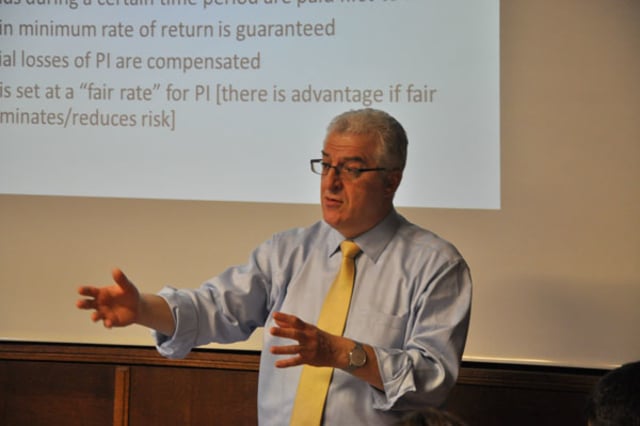The following blog post is another contributory piece by Emanuela Matei, Associate Researcher at the Centre of European Legal Studies, Bucharest. Matei holds a Juris Master in European Business Law (Lund University, June 2012), a Magister legum (Lund University, June 2010) and a BSc in Economics & Business Administration (Lund University, June 2009). We are very glad to welcome her […]
State Aid Law
Blog
State Aid Uncovered Blog
In Lexxion’s State Aid Uncovered blog, Prof. Phedon Nicolaides publishes weekly critical analyses of recent State aid judgments and decisions. Each post presents the key points of a court judgment or EU Commission decision, places it in the context of similar case law or practice, assesses the underlying reasoning and highlights any inconsistencies or contradictions.
Guest contributions from other State aid experts will also be published on the blog at irregular intervals to complement the content of the blog posts.
3. December 2015 |
Guest State Aid Blog
by Emanuela Matei
1. December 2015 |
State Aid Uncovered
by Lexxion Publisher
Find below the court’s diary for all State aid cases. Would you like to write a comment on one of them? Please don’t hesitate and get in touch with us ([email protected]), we are happy to publish your comment on the blog Thursday 07/12/2015 Judgment in Case T-242/12 – SNCF v Commission (General Court – Seventh Chamber) Thursday 17/12/2015 Judgment in […]
1. December 2015 |
State Aid Uncovered
by Phedon Nicolaides
State aid is granted on the date the relevant public authority makes an irrevocable commitment to grant it or creates a legal entitlement for the beneficiary. Loans that impose public policy obligations on borrowers are not in conformity with the behaviour of a private investor. Introduction This is a rather long article because it examines a rich case that […]
24. November 2015 |
State Aid Uncovered
by Phedon Nicolaides
Public investment is free of State aid when it is made at the same time and on equal terms with investments by private investors. In the absence of an equivalent private investment, public investment does not constitute State aid when it is demonstrated ex ante that it is capable of generating market rates of return. Introduction Public authorities are […]
16. November 2015 |
State Aid Uncovered
by Phedon Nicolaides
Favourable tax treatment to alleviate “structural disadvantages” suffered by certain companies is a selective measure that falls within the scope of Article 107(1). Introduction Member States use taxes not just to raise revenue but also as instruments of public policy. They impose taxes on activities they want to discourage [e.g. smoking, driving] and they relieve from taxes activities they […]
11. November 2015 |
Guest State Aid Blog
by Dimitrios Kyriazis
The following is a summary of the main points that were presented and the issues that were discussed in the seminar on State aid in Tax Measures that was held in Brussels on 26-27 October 2015. The summary has been prepared for information purposes only and it is not meant to be a precise record of the proceedings of the […]
10. November 2015 |
State Aid Uncovered
by Phedon Nicolaides
The value of land corresponds to its market price that can be determined through open and unconditional bidding. If a price cannot be determined through bidding, then expert valuation is an alternative method for establishing the value of land. Expert valuation has to be carried out ex ante, by a recognised independent surveyor, on the basis of reasonable assumptions and […]
5. November 2015 |
Guest State Aid Blog
by Lexxion Publisher
Find below the court’s diary for all State aid cases. Would you like to write a comment on one of them? Please don’t hesitate and get in touch with us ([email protected]), we are happy to publish your comment on the blog. Wednesday 11/11/2015 Judgment in Case C-505/14 – Klausner Holz Niedersachsen (Court of Justice – Second Chamber) Thursday 12/11/2015 Judgment in […]
4. November 2015 |
State Aid Uncovered
by Phedon Nicolaides
Incompatible State aid must be recovered from “successor” companies which acquire previously aided companies and enable the latter to continue their operations without any change. Introduction In this article I review two decisions in which the Commission determined that incompatible aid had to be recovered from “successor” companies. Those were companies which had obtained the assets of the […]
27. October 2015 |
State Aid Uncovered
by Phedon Nicolaides
A SGEI provider does not have to be efficient by industry standards in order to receive compensation for its next extra costs. Although the conditions for compatibility of public service compensation under Article 106(2) TFEU appear to be similar to the Altmark criteria, they have very different objectives. Introduction Even since the Altmark judgment of July 2003, public authorities […]
30. September 2014 |
State Aid Uncovered
by Phedon Nicolaides
A measure determined independently by similar public entities is not selective even if it varies across those entities. A measure is selective when the entity that has adopted it, applies it differently to undertakings which are within its jurisdiction and in a comparable situation. A public entity may differentiate its measures provided the differentiation can be objectively justified. Introduction […]
23. September 2014 |
State Aid Uncovered
by Phedon Nicolaides
The Commission has wide discretion in assessing the compatibility of State aid with the internal market. Each case is assessed on its own merits and, therefore, the Commission is not bound by precedents or decisions on previous cases. Sale of shares held by public authorities may be required if divestment is necessary for long-term viability of aid beneficiary. Introduction […]
16. September 2014 |
State Aid Uncovered
by Phedon Nicolaides
If a public authority guarantees a loan to a company that is in financial difficulty and charges a low premium, the whole loan, not just the difference between the market rate of premium and the rate actually charged, will be considered to be State aid. Simultaneous capital injection by public and private investors is not enough to eliminate State aid […]
9. September 2014 |
State Aid Uncovered
by Phedon Nicolaides
Maintaining capacity that is necessary for the provision of normal services cannot be classified as a service of general economic interest. State aid may not be granted towards the costs of cleaning up pollution caused by the aid recipient itself. State aid to a legal monopoly may still affect trade if there is competition for the monopoly rights or if […]
2. September 2014 |
State Aid Uncovered
by Phedon Nicolaides
Article 107(1) also applies to payments that offset the damage caused by natural disasters. It is irrelevant that the compensation is partial or that competitors did not suffer similar damage. A measure can be State aid even if it is partially or wholly funded by private resources. It is sufficient that the resources come under state control. A measure is […]
26. August 2014 |
State Aid Uncovered
by Phedon Nicolaides
Taxes may not be examined by the Commission in the context of Article 107 even if they finance State aid measures. By contrast, the Commission may examine a tax in the context of its assessment of the compatibility of aid with the internal market when the tax is inseparable from an aid measure. A tax is inseparable from an aid […]
19. August 2014 |
State Aid Uncovered
by Phedon Nicolaides
An undertaking that has received incompatible State aid must pay it back or, if it cannot, it must be liquidated. Before a recipient of possibly incompatible State aid is liquidated, its assets can be sold off to the highest bidder. The buyer of previously subsidised assets does not benefit from State aid if i) it pays a market price and […]
12. August 2014 |
State Aid Uncovered
by Phedon Nicolaides
Competitive selection of the operator of an infrastructural facility normally eliminates State aid. However, modifications to the contract after the operator is selected may confer an advantage that constitutes State aid. Public funding that is calculated on the basis of the “funding gap” method ensures that the aid is necessary and proportional. Introduction Several recent articles in the blog […]
4. August 2014 |
State Aid Uncovered
by Phedon Nicolaides
Internal transfer of capital which is not used to fund new economic activities is not State aid. Injection of fresh capital to satisfy solvency and liquidity requirements still has to comply with State aid rules. A private investor always has the option of not injecting new capital and may opt instead to close down the business. A private investor always […]
29. July 2014 |
State Aid Uncovered
by Phedon Nicolaides
A public authority that injects capital in an undertaking [or provides any other kind of finance] must ensure that the funding can achieve the rate of return that can, in principle, satisfy a private investor. The rate that can satisfy a private investor and ensure that the funding is free of State aid is the rate that covers the cost of […]























